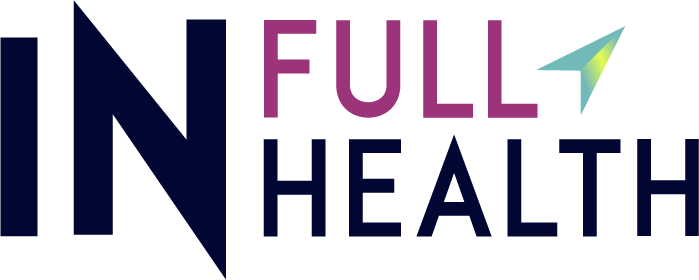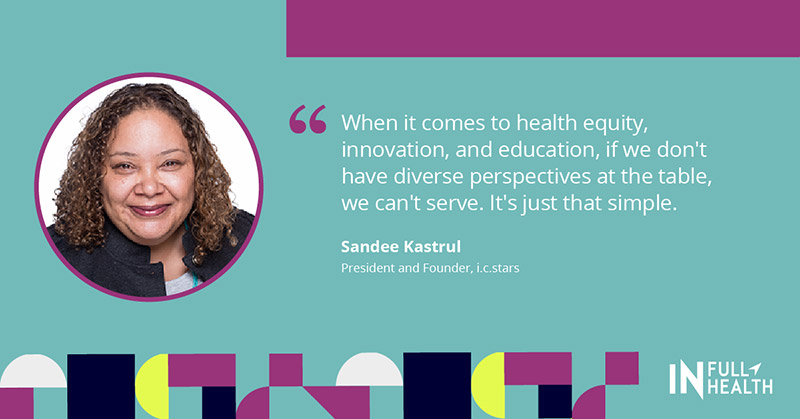Sandee Kastrul (she/her) is the founder and president of i.c.stars, which invests in historically marginalized and underserved individuals by providing opportunities for technology-based workforce development, community leadership training, internships, and job placement.
 A lover of education and a lifelong teacher, Sandee’s passion for education is what has pushed her throughout her career and driven the mission at i.c.stars for almost 25 years.
A lover of education and a lifelong teacher, Sandee’s passion for education is what has pushed her throughout her career and driven the mission at i.c.stars for almost 25 years.
Here, Sandee discusses how her lifelong mission to teach has driven her work and how our understanding of health equity must also look at individual and community financial and social health.
In Full Health (IFH): You believe that everyone has a “planetary responsibility” — can you share more about what this means, and what yours is?
Sandee Kastrul: Your planetary responsibility is one word. Everyone has a verb, and it is what they are on this planet to do. If you’re thinking right now, “What’s mine?” you already know it. It’s the word that just came to you and now you’re kind of rationalizing it away. My verb, my one-word mission is to teach.
I spent years as a math and science teacher. I trained new teachers. I taught arts in education. I taught substance abuse prevention and violence prevention. You name it, I love to teach it. I think it’s really what I’m on this planet to do. I’m always teaching.
I think that verb that we all have centers us and grounds us and routes us. When you’re at a crossroads thinking, “Oh my gosh, what does this mean?” or “I’m burnt out,” or “I need self-care,” or “I feel disconnected,” remember what your verb is, your purpose, and then work from there.
Sandee Kastrul
President and Founder, i.c.stars
IFH: How does your mission of teaching inform your work — and how did it lead you to found i.c.stars?
Sandee Kastrul: My real passion throughout my career has been to change the equity structure in education. When we funded i.c. almost 25 years ago now, it was really about changing the paradigm of the time. We were no longer competing as American businesses with our neighbors down the street. We were competing on a global scale, old business models weren’t holding up, and we needed people who could walk between worlds. People who the world wasn’t necessarily set up for them.
We wanted to create an organization that would source all this great talent from our communities and from our inner cities and leverage that resiliency in business. Our goal wasn’t to start a charitable organization and help the poor and get them jobs. Charity is something we do, not someone we work with. The paradigm of workforce development was a linear process: You go somewhere, you get a skill, and you never return. We wanted to create a system that was really a cycle, where you learn something and you don’t really move on until you teach someone else.
SUBSCRIBE
Stay in the loop about new blog posts from equitable health innovation leaders, helpful resources and tools to help you bring the Principles to life, upcoming events, and more by joining our email list.
SUBSCRIBEIFH: A key part of i.c.stars’ work is to connect companies with diverse applicants — why is prioritizing diversity in your hiring practices — especially in health innovation — important?
Sandee Kastrul: Simply put, it’s important because we are left out. When we have more people at the table, we are going to build things that have a lot more meaning and a higher success rate because we’re looking at it from different angles. It’s all diversity — not just racial, ethnic, and religious diversity, but it’s also about age, gender, and sexual orientation.
The more we can blow innovation up so that people with different perspectives and experiences are a part of the solution, the more that our solutions will serve more people.
Sandee Kastrul
President and Founder, i.c.stars
IFH: i.c.stars provides individuals with the talent, tools, and network to be successful in the tech industry — how is this work connected to larger goals of health equity?
Sandee Kastrul: We know that our financial capital, our social capital, and our health capital are closely connected. People who graduate from i.c. see a 300% increase in pay within 6 months. That’s not just substantial — it’s life-changing.
Within a year, people are making more money than their parents combined, and that impacts everything. It’s impacting how we raise our children. It’s impacting the things that are afforded to our children from education to career access to insurance. i.c.stars alumni can now go beyond government-assisted health care to having employer insurance for the first time — and it impacts rethinking the way we even see our own physical health and how it’s impacted by economics and by our financial status and our ability to make change.
The second way our mission is connected to larger goals of health equity is in developing community leaders who are going to impact the policies that are made for us instead of with us or by us — including health care policies.
Lastly, it’s in the businesses and economic opportunities that are created. Businesses have been started in our alumni community, and then those businesses hire folks from the community. i.c.stars supplied diversity to this industry and helped individuals gain social, economic, and intellectual capital — but it’s also an exponential model where those 25 people turn around and impact thousands.
Community Connections
I want to send a shout-out to all of our i.c.stars alumni who are building business and doing great work day in and day out. They are the future, innovating solutions to complex problems.
Sandee Kastrul
President and Founder, i.c.stars
IFH: What advice do you have for historically marginalized innovators working in health tech and health innovation?
Sandee Kastrul: I think the most important thing is that we not be invisible. As women, we’re really good at setting the table for other folks to eat, and we feed ourselves last. How many times have we stood in the kitchen over the pot while everybody else eats? We do that as a cultural norm, but in business, it has to be the opposite. We have to push ourselves to be seen first. As innovators, we have to sing our song. We have to shout it from the rooftops. We have to step out of our comfort zone of only talking to people who like us or agree with us.
And then, on the flip side of that is we need to figure out how we support each other. How do we bring people in? Even if we perceive ourselves as competitors, there is plenty of solution to go around. The more that we can claim each other, the better — because we’re mightier together.
SUBSCRIBE
Stay in the loop about new blog posts from equitable health innovation leaders, helpful resources and tools to help you bring the Principles to life, upcoming events, and more by joining our email list.
SUBSCRIBE


Comments are closed.